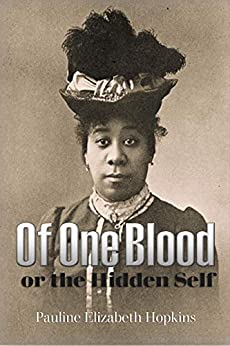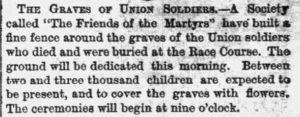Once upon a time in Black Entrepreneur History lived an African American woman named Pauline Elizabeth Hopkins who became an outstanding writer and journalist/editor as well as singer and novelist, believed to have written the first African American fiction novel with African characters, taking place on the continent of Africa.

Born in Portland, Maine in the year of 1859 to free African American parents, she grew up with stepfather William (a barber at that time according to the 1870 Census) and Sarah (housewife) Hopkins. Pauline ended up raised in Boston in a good household. Her biological father was Benjamin Northup, the man to whom her mother Sarah married prior to William. Pauline became known by her stepfather’s last name.
She became interested in the arts, theater and singing as her parents had already founded the Hopkins Colored Troubadours, a Family Theater Company. She performed as singer in the company which was known for bringing great entertainment for audiences in the style of musical comedies. The Family Theater Company also entertained as support for other acts.
She loved entertaining so much that it was in 1879 that she wrote her first play titled Slaves’ Escape or The Underground Railroad making her a playwright at the age of 20.
In 1881, the Hopkins Colored Troubadours performed their own musical play “The Flight for Freedom” which was a narrative of an escape of a band of refugees in the days before the war, “interspersed with musical selections, both vocal and instrumental”. Pauline’s father, William, played the overseer character Jim and Pauline was part of the Troubadour Quartet that sang in between scenes, the favorite selection being “The Sunny Southern Home”.[1]
“The solo singing by Miss Pauline E. Hopkins was fine and won her a deserved recall.”
The Boston Globe (Boston, Massachusetts)30 Sep 1881, Fri Page 3
In 1882, it is recorded in The Boston Globe where she performed at a place called The Casino where they had two concerts scheduled that day. Pauline sang Jubilee Songs “Waiting” in a solo for that evening for Part II of the concert with the Hopkins Colored Troubadours[2].
Literature
Besides her first play and her gifted voice in song, Pauline Elizabeth Hopkins was an excellent writer, and it was this writing that followed her throughout her years as a teenager through adulthood, beyond performing with the theater company.
She’s written multiple works of literature following her first play which are listed below:
- Talma Gordon (1900; a short story mystery)
- Contending Forces: A Romance Illustrative of Negro Life North and South (a novel)
- Hagar’s Daughter: A Story of Southern Caste Prejudice(serialized;published in the Colored American Magazine)
- Winona: A Tale of Negro Life in the South and Southwest (serialized;published in the Colored American Magazine)
- Of One Blood, Or the Hidden Self (serialized;published in the Colored American Magazine)
Being that it was extremely difficult to break into the literary world for an African American woman, she would often sell her books door to door[3]. Although she isn’t spoken of today and is lesser known, she was noted as being one of the most prolific African American writers of her time.
Because she became an editor for the publishing company that owned the Colored American Magazine for four years, between 1901 and 1904, it was much easier for her works to be published in what was the African American publication with the widest circulation at that time. The company that owned the Colored American Magazine was the Colored Co-operative Publishing Company, and the magazine was one of the first magazines to publish the works of the literature of Black writers which showcased the life of Black people in various aspects socially as well as what African Americans contributed to politics. Although the Colored American Magazine served and targeted the Black audience, there was a number of white people who consumed the magazine as well, and because of this, the periodicals in the magazine were known to be conciliatory, placating for that select audience many times. This may have resulted in Pauline Hopkins being removed from the magazine because her stance didn’t pacify the white audience, according to W.E.B. Dubois[7].
Also according to The Daily Hampshire Gazette of June 25, 2008, her career had taken a downturn at some point due to a battle she selected to have with the founder of Tuskegee University, Booker T. Washington. It is assumed that she stopped writing for the Colored American Magazine because the Tuskegee University founder bought the magazine and had her replaced with someone else, a person who was united with him in an unknown particular cause or causes.
In either case, Pauline also wrote for the publication called Voice of the Negro for one year (1904-1905). She was also a founding member of the Boston Literary and Historical Association.
Of One Blood
Of One Blood, or the Hidden Self is a coming of age story about a medical student who doesn’t actually care to be Black or about Blacks at all but ends up in Ethiopia for monetary raid but ends up discovering much more about history that he never knew. The book was based off of the Biblical truth in Acts 17:26 that God “made of one blood all nations of men for to dwell on all the face of the earth”. She wanted to bring to order the disorder of white and black to make it understood that we are of one blood or all kin. Pauline was the 1st African American novel that contained African characters that took place in Africa.
Her Later Years
In the year 1920 she was a proofreader at a mechanical laboratory at the age of 54, and in 1930, she was a stenographer for a college. This was the year that she died.
Death
Author and singer, Pauline Elizabeth Hopkins passed away on August 13, 1930 and was buried in Cambridge Cemetery in Cambridge, Massachusetts[4]. The circumstances surrounding her death are as follows from The Boston Globe of 1930:
“Mrs. Pauline Hopkins, 71, colored of 71 Jay St., Cambridge, Died last night at the Cambridge Relief Hospital from burns sustained when her clothing caught fire yesterday afternoon from an oil stove.
Firemen were called to the house when the accident occurred and administered first ad, but she was so badly burned her name was placed on the danger list at the hospital. She lived alone and has no known relatives.”[5]
Sources
[1]The Boston Globe (Boston, Massachusetts)30 Sep 1881, Fri Page 3
[2]The Boston Globe (Boston, Massachusetts) 25 Jun 1882, Sun Page 3
[3]The Bangor Daily News (Bangor, Maine) 26 Feb 1992, Wed Page 19
[4]Find a Grave, database and images (https://www.findagrave.com : accessed 19 November 2020), memorial page for Pauline Elizabeth Hopkins (1859–13 Aug 1930), Find a Grave Memorial no. 9910245, citing Cambridge Cemetery, Cambridge, Middlesex County, Massachusetts, USA ; Maintained by Find A Grave .
[5]The Boston Globe (Boston, Massachusetts) 13 Aug 1930, Wed Page 11
[6] Daily Hampshire Gazette 25 Jun 2008, Wed · Page 17
[7]Ohio State University Press; Furnace Blasts for the Tuskegee Wizard: Revisiting Pauline Elizabeth Hopkins, Booker T. Washington and the “Colored American Magazine”; Alisha R. Knight
Year: 1930; Census Place: Cambridge, Middlesex, Massachusetts; Page: 1A; Enumeration District: 0049; FHL microfilm: 2340651
Year: 1920; Census Place: Cambridge Ward 7, Middlesex, Massachusetts; Roll: T625_707; Page: 11B; Enumeration District: 73
Year: 1870; Census Place: Boston Ward 3, Suffolk, Massachusetts; Roll: M593_642; Page: 140A; Family History Library Film: 552141





More Related Stories
James Wormley – Founder of the Most Expensive Hotel in Washington D.C. in 1800s – the Wormley Hotel
William E. Matthews – Wealthy Financial Broker & Civil Rights Leader of 1800s
Charles Porter Grove – Owner of Montana and Illinois Gold Mining Company & Leader of the “Dreamed” Grove City, Montana